Impact Stories from Youth Engagement Policy Area

Mentor(s): Eileen Brewer, Rekha Pai-Kamath, Chepkemoi Magdaline
Mentor Type: Impact
Policy Area(s): Education Diplomacy/Mentoring, Empowering Women and Girls, Entrepreneurship, Professional Growth, Youth Engagement
TechWomen Impact Coaches Eileen Brewer and Rekha Pai-Kamath, as well as TechWomen 2019 Emerging Leader Chepkemoi Magdaline, were featured speakers at this month’s 2019 Grace Hopper Celebration. The annual event is the world’s largest gathering of women technologists and brings comprehensive programming featuring global women leaders.
Eileen’s session, “Pitch Perfect,” offered 10 elements for creating an impactful pitch deck. Rekha was a featured panelist in “Creating Meaningful Impact through Tech Non-profits,” sharing her expertise on how tech can offer sustainable solutions to leading issues. Chepkemoi, who attended the event after week one of TechWomen 2019, was a winner of the AnitaB.org Pass It On program, which offers grants to women whose projects support women in computing. Alongside TechWomen alumnae, Chepkemoi is a part of North-Rift Women in STEM Inclusion Project, an initiative that organizes three-day boot camps women in rural regions of Kenya. At GHC, Chepkemoi led a session and participated in a panel speaking about her work supporting and empowering women and girls.
Report Date...: 10/7/19
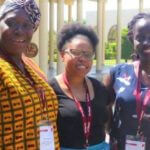
Fellow recognized for work in digital inclusion
Fellow(s): Sophie Ngassa
Country: Cameroon
Cohort: 2013
Policy Area(s): Education Diplomacy/Mentoring, Empowering Women and Girls, Entrepreneurship, Professional Growth, Youth Engagement
This month, 2013 fellow Sophie Ngassa was highlighted as a woman who is playing an integral role in shaping the future of the internet in Africa. She was featured by the African School on Internet Governance, an annual five-day residential course that brings together Africans from diverse backgrounds to speak about global internet governance and work to shape the future of the internet landscape.
Sophie is a civil engineer, STEM advocate and founder of the Center for Youth Education and Economic Development, a digital empowerment training center for youth in Cameroon. Sophie is an advocate for an open internet – “an internet without borders,” she says – and works to empower civilians and policymakers to ensure that the internet is both safe and accessible to everyone, regardless of location, gender and economic background.
Report Date...: 10/7/19
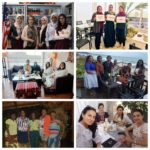
Mentor(s): 2019 Emerging Leaders
Policy Area(s): Economic Impact, Education Diplomacy/Mentoring, Empowering Women and Girls, Entrepreneurship, Environmental Sustainability, Professional Growth, Youth Engagement
On Sunday, IIE welcomed the arrival of the 2019 cohort of 108 Emerging Leaders from 21 countries. This year’s Emerging Leaders will join TechWomen’s network of over 300 Professional Mentors, Cultural Mentors and Impact Coaches – and an alumnae community of over 600 fellows and 700 mentors – as they embark on five weeks of mentorship and professional exchange.
This year’s 40 host company partners include Glassdoor, 23andMe and Salesforce; the program is also welcoming a group of new host companies, including Airbnb, SurveyMonkey, Okta and Zume. TechWomen’s first week of programming includes the Cultural Kickoff, where Emerging Leaders will showcase the rich culture of their home countries, as well as Action Plan Workshop 1, where country teams will establish the foundation of their action plans alongside their Impact Coaches.
Leading into the program, three 2019 Emerging Leaders wrote guest posts on the TechWomen blog in the series Emerging Leader Voices, sharing their perspectives as women in STEM and highlighting and their achievements, challenges and life lessons. Follow along as we provide #techwomen19 updates on Twitter, Instagram, and the TechWomen blog!
Report Date...: 9/23/19

2013 seed grant winners hold 6th annual STEM expo
Fellow(s): Sandra Tererai, Nomso Kana, Chioniso Dube-Hachigonta
Country: South Africa
Cohort: 2013
Policy Area(s): Education Diplomacy/Mentoring, Empowering Women and Girls, Entrepreneurship, Professional Growth, Youth Engagement
This month, 2013 fellows of South Africa Sandra Tererai, Nomso Kana and Chioniso Dube-Hachigonta held a one-week STEM expo for 30 students representing South Africa, Zambia, Zimbabwe, and Eswatini. Taungana, a TechWomen 2013 seed grant-winning initiative, holds the annual event to connect rural girls to women mentors, educational resources and leading professionals in STEM fields.
Throughout the week, the students (called Ambassadors) were immersed in multiple STEM industries, visiting local universities, science museums, tech companies and a local power utility. During their day trips, the students received hands-on lessons on nuclear fission, cryptocurrency, aviation, coding, health sciences and the electricity generation process. During a visit to Uber, the Ambassadors got a behind-the-scenes look at the local Greenlight Hub, followed by a session on design thinking. The week also included a pitch night where Ambassadors pitched 90-second scientific solutions to social challenges.
Report Date...: 9/23/19
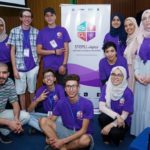
Fellow speaks at youth STEM training event
Fellow(s): Salma Bekkouche
Country: Algeria
Cohort: 2018
Policy Area(s): Education Diplomacy/Mentoring, Professional Growth, Youth Engagement
Last month, 2018 fellow Salma Bekkouche was a judge and speaker at a STEM training for youth in Setif, Algeria. The program host, STEPS, is an initiative that offers hands-on STEM activities for young people ages 10-18 that allow them to problem-solve and innovate.
The three-day training was themed on using technology to solve environmental challenges. Each team applied their training to create social enterprises, receiving feedback from Salma and a panel of judges at the concluding event. Salma also presented to the group, sharing five tips on how to build a successful career. “If you love it, do it,” she said. “If you don’t love it, don’t do it. If you don’t know it, try it.”
Report Date...: 9/23/19

Fellow mentors Kyrgyzstan’s first all-women space program
Fellow(s): Zainab Saleem, Kyzzhibek Batyrkanova, Ainura Sagyn
Country: Kyrgyzstan, Pakistan
Cohort: 2017
Policy Area(s): Education Diplomacy/Mentoring, Empowering Women and Girls, Professional Growth, Youth Engagement
2017 fellow of Pakistan Zainab Saleem is mentoring members of the Kyrgyz Space Program, an all-women team that is building and launching Kyrgyzstan’s first satellite by 2020. The women, many of whom are not trained in STEM fields, meet with Zainab bi-weekly to gain skills in robotics, engineering and satellite technology. The core team, comprised of women ages 18-24, includes 2019 TechWomen Emerging Leader Kyzzhibek Batyrkanova.
Zainab holds a master’s degree in aerospace and aeronautical engineering and is currently working on groundbreaking SAR satellite technology at Finland’s ICEYE as an attitude and orbit control system engineer. She was introduced to the Kyrgyz team by 2017 fellow of Kyrgyzstan Ainura Sagyn after both fellows participated in TechWomen’s delegation trip to Uzbekistan.
After noticing that the space program’s nanosatellite was too far off from its target, Zainab began by dividing the women into teams – a mechanical team, an electronics team and an engineering team – and began developing a curriculum that would help the women reach their goal. “Zainab has greatly impacted our program,” says 2019 Emerging Leader Kyzzhibek. “We started with basics, like making a robot that could wipe the floor. That was fun. Now we’ll proceed with the basics of the cube satellite technology next month.”
Report Date...: 9/16/19
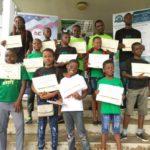
Fellow completes 2019 STEM training for youth in Cameroon
Fellow(s): Mpara Faith
Country: Cameroon
Cohort: 2017
Policy Area(s): Education Diplomacy/Mentoring, Empowering Women and Girls, Entrepreneurship, Professional Growth, Youth Engagement
Recently, 2017 fellow Mpara Faith concluded the 2019 program for ICT4KIDS, her training initiative that educates and empowers youth in Cameroon. Launched in 2018, ICT4KIDS brings STEM education and community development skills to children ages five to 18.
This year, Mpara was able to expand the program and offer two five-week sessions for participants, each attended by students from different regions and schools throughout Cameroon. Through lessons and lectures, team building exercises and pitch training, the sessions explored game development, graphic design, leadership and critical thinking. In the first session, the students developed their own games using Scratch technology, culminating in a game development competition with prizes for winning teams.
The program’s second session invited participants from ICT4KIDS’ inaugural training in 2018, and included additional lessons on Python programming, electronics, pitching and project implementation. The students had an opportunity to meet with Buea’s local Facebook Developers Circle, asking engineers and programmers questions about their careers. The five weeks concluded with students pitching an impact project that addressed an issue in their community. In one presentation, a student presented on bribery, outlining its causes, effects and her solutions to address it through education and advocacy.
Report Date...: 9/9/19

Fellow speaks at international conference in Japan
Fellow(s): Patu Ndango Fen
Country: Cameroon
Cohort: 2017
Policy Area(s): Economic Impact, Entrepreneurship, Environmental Sustainability, Professional Growth, Youth Engagement
Last month, 2017 fellow Patu Ndango Fen was a featured panelist at the Tokyo International Conference on African Development. The conference is initiative of the Japanese government and held in partnership with the United Nations Development Program, World Bank and the African Union Commission.
Patu is the founder of Closed Loop System Ventures, a waste management social enterprise, as well as the president of its foundation. In one panel, “Human Capital Development for Youth Entrepreneurship,” Patu spoke about innovative education approaches that empower and engage youth. “Africa has a young population and is experiencing a rapid growth rate,” she said. “Young people should be encouraged to venture into entrepreneurship in order to create jobs and contribute to resolving pressing social, environmental and economic challenges.”
Report Date...: 9/2/19

IIE collaborates with fellows’ initiatives for 2019 program
Fellow(s): Sabine El Kahi, Aiturgan Zulpukarova, Mide Ayeni
Country: Kyrgyzstan, Lebanon, Nigeria
Cohort: 2014, 2017
Policy Area(s): Empowering Women and Girls, Entrepreneurship, Youth Engagement
This year, IIE collaborated with three fellows to bring items from their initiatives to this year’s TechWomen company partners and speakers. Each product – wooden pens, fabric notebooks and wool business card holders – was handcrafted by participants in each fellow’s community-based initiative.
2014 fellow of Lebanon Sabine El Kahi supplied wooden pens from Kids Genius, her STEM-based initiative that spreads maker culture to young students. “The pens were made by our team with the help of three students with learning difficulties,” says Sabine. “Making the pens allowed them to learn, develop new skills and improve their confidence in their abilities.”
2017 fellow of Kyrgyzstan Aiturgan Zulpukarova is the founder of Kuragami, an initiative that works with women artisans in the Issyk-Kul region of Kyrgyzstan to make sustainable and ethically sourced products. Aiturgan supplied business card holders made of merino wool and naturally hand-dyed with walnut leaves. 2017 fellow of Nigeria Mide Ayeni supplied notebooks made from recycled paper and upcycled African ankara fabric made by women in Nigeria. Mide is the founder of Pearl Recycling, an initiative that collects waste such as plastic, car tires, newspapers and other recyclables and trains youth and women to transform them into furniture and upcycled items. All items will serve as gestures of appreciation for the companies and speakers that contribute to the 2019 program.
Report Date...: 8/26/19
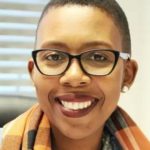
Fellow named Next Einstein Forum Fellow
Fellow(s): Fanelwa Ajayi
Country: South Africa
Cohort: 2017
Policy Area(s): Education Diplomacy/Mentoring, Entrepreneurship, Professional Growth, Youth Engagement
This month, it was announced that 2017 fellow Fanelwa Ajayi is one of 25 scientists named a Next Einstein Forum (NEF) Fellow for their 2019-2021 class.
Through its programs, NEF seeks to connect science, society and policy in Africa and the rest of the world. NEF Ambassadors are young science and technology champions who are selected to lead public engagement activities and partner with established mentors and researchers to advance their own careers in STEM. Fellows are selected by an international committee of scientists, and are required to demonstrate how their work is contributing to solving Africa’s leading challenges.
Fanelwa is a research leader and senior lecturer at the University of the Western Cape, as well as the founder of AmaQawe ngeMfundo, an initiative that brings hands-on STEM learning and experiments to local schools.
Report Date...: 8/26/19

